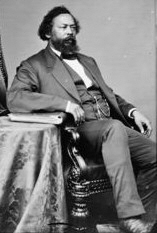See also: Reconstruction; Slavery
March 17, 1825 - March 21, 1894

Benjamin Sterling Turner, businessman and Reconstruction-era Alabama congressman, was born near Weldon, Halifax County on March 17, 1825. Turner was born enslaved and the identity of his parents is unknown. In 1830, his enslaver, the widowed Elizabeth Turner, took young Benjamin Turner to live with her in Selma, Alabama. Although he had no formal schooling, he managed to obtain an education, likely by sitting in on lessons for the Turner family's white children. He was later enslaved by Major W.H. Gee, a Selma hotel owner who had married Elizabeth Turner's stepdaughter. Benjamin Turner managed Gee's hotel and livery stable and was permitted to keep a portion of the business' profits. After the death of Major W.H. Gee, Turner was enslaved by Dr. James T. Gee, Major Gee's brother. J.T. Gee also owned a hotel that Turner managed.
After obtaining his freedom, probably as a result of the Emancipation Proclamation, he developed a prosperous livery stable business and was elected Dallas County tax collector in 1867. On December 22, 1868 he won a seat on the Selma City Council but resigned on 6 Sept. 1869. In September 1870 he was chosen foreman of Central Fire Company, No. 2, in Selma, a unit consisting of forty members. Nominated unanimously by the Republican party in 1870 for the First District seat from Alabama in the Forty-second Congress, Turner sold his horse to finance his campaign and won the election handily.
In Congress Turner introduced legislation aimed at stimulating the South's economy, and he stressed this need in his appeal for a public building program to aid war-devastated Selma. Other bills that he introduced were designed to restore political and legal rights to ex-Confederates generally and to some of his Dallas County constituents in particular, but they were not approved by Congress. His speech, Public Buildings in Selma, Alabama—The Refunding of the Cotton Tax , was printed as a pamphlet in 1872. This and other speeches reveal an unbiased concern for all of his constituents. During his tenure in the House Turner was described by the Washington correspondent for the New York Globe as "a big broad-shouldered man with a large nose and curly hair." He also observed that Turner was "very quiet, always present (when the House was in session) . . . and among Republican colleagues has a considerable reputation for good sense and political sagacity."
Although he received the Republican nomination in 1872, Turner was the victim of a split in party ranks that resulted in his defeat as a candidate for reelection to Congress, a loss that marked the end of his political career above the local level. Unwilling to engage in political infighting, he returned to Dallas County in March 1873 and confined himself largely to farming and civic affairs; however, he did not abandon local politics.
He served as an election official for Selma municipal elections in 1875, 1877, and 1891 and won a seat on the Selma City Council in 1885. When his two-year term ended, he chose not to seek reelection. In 1880 he was an Alabama delegate to the Republican National Convention in Chicago. Turner died in Selma, where he was buried in Live Oak Cemetery.